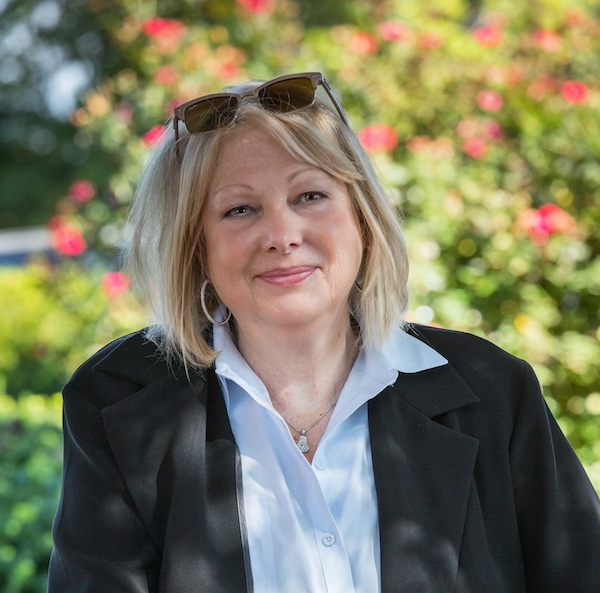(Above) Pat Schaumann, founder and manager of MPI's HMCC program, was honored by Deborah Hinson Thursday at WEC for her invaluable contributions to event professional education and the industry. Lead photo courtesy RVRB.
The Healthcare Meeting Compliance Certificate (HMCC) program was first presented by Saint Louis University and MPI. Accordingly, WEC’s return to St. Louis is extra special for the MPI MD Community and the HMCC program. We caught up with Pat Schaumann, CMP, CSEP, DMCP, HMCC, founder and manager of MPI’s HMCC and Medical Meeting Professional (MMP) certificate programs, for an update on the MPI MD Community and its activities.
Can you tell us about MPI MD education and activities and why you’re excited about them?
MPI MD’s 2025-2026 goals are ambitious and strategically aligned to support medical meeting professionals in a rapidly evolving industry. We are actively listening to our members and are committed to delivering guidance and solutions that address their most pressing needs, including:
- Celebrating National Public Health Week (April 2-12). MPI MD will host a week-long series of educational opportunities, including certificate programs such as the HMCC, MMP and the HMCC Refresh course. The week will also feature webinars focused on emerging healthcare trends and attendee wellness initiatives.
- F&B Pricing Survey and Caps Guide. An Ad Hoc Council has been established to conduct comprehensive research on food and beverage pricing across hotels, restaurants and venues. The findings will inform the development of a much-needed F&B Caps Guide to support our members’ planning and budgeting efforts.
- University Outreach Initiative. MPI MD will launch a targeted marketing campaign to universities offering meeting planning programs, with the goal of integrating the MMP certification into their curricula and fostering the next generation of medical meeting professionals.
- Expanding Strategic Partnerships. We will continue to grow and strengthen our collaborations with leading medical conference partners, including Pharma Forum, Thinc360, IMEX and Momentum, to broaden our reach and impact.
- Advancing HMCC and MMP Programs. Ongoing development and promotion of the HMCC and MMP designations will remain a top priority as we aim to enhance industry standards and elevate professional excellence.
Why does the MPI MD Community continue to be so important for medical meeting planners?
We offer continuing education opportunities, certifications and training programs to keep members current with industry standards, compliance and best practices, as well as educational resources and credentialing that can enhance professional credibility and open doors to new opportunities.
MPI MD creates a sense of community, allowing members to connect with peers who share similar challenges and goals, in addition to collaborative opportunities, mentorship and sharing of insights across organizations and regions.
MPI MD also represents members’ interests in regulatory, legal and policy discussions, ensuring the unique needs of the medical meeting industry are heard. We help shape and uphold standards that protect the integrity of medical events and ensure compliance with laws and ethical guidelines.
Our members gain access to valuable resources, such as industry research, toolkits, surveys, templates and benchmarking data, and provides critical updates on changes in healthcare regulations, event compliance and travel policies that affect medical meetings.
Membership in MPI MD signals you have a commitment to excellence and ethical practices.

Can you tell us about medical meetings trends you’re paying a lot of attention to in 2025?
Here are the top medical meeting trends to watch closely in 2025-2026, as they are shaping how medical events are planned, delivered and evaluated.
Compliance-driven planning
- Global regulatory evolution: Continued tightening of healthcare compliance (e.g., EFPIA, PhRMA, APAC guidelines) is demanding greater transparency and documentation.
- Spend caps and fair market value: More focus on precise cost controls, including new tools and surveys to help planners stay within regional limits.
Attendee wellness and experience
- Holistic wellness: Integration of mental health, mindfulness and burnout prevention strategies into agendas—especially important for HCPs (healthcare professionals).
- Personalization: Agendas and environments are being tailored to attendee profiles, learning styles and special needs (e.g., neurodiverse accommodations).
Data-driven decisions
- ROI and outcomes measurement: Emphasis on measurable outcomes—beyond satisfaction—to demonstrate the value of the meeting for HCPs and sponsors.
- Behavioral data: Use of real-time engagement tracking to dynamically adjust formats, content and delivery.
Hybrid and micro-meeting models
- Smaller, targeted events: Rise of localized, disease-specific or specialty-focused meetings with highly curated content.
- Hybrid optimization: Rather than large-scale hybrid events, planners are integrating smaller virtual components to extend reach or offer asynchronous access.
Sustainability & ESG integration
- Environmental accountability: Sponsors and planners alike are being asked to reduce waste, report carbon footprints and align events with ESG goals.
- Venue selection: Preference for venues with green certifications and strong community engagement policies.
DEI and global inclusion
- Cultural sensitivity: Planning with global inclusivity in mind—language support, dietary diversity and culturally relevant programming.
- Equity in access: Greater emphasis on inviting diverse speakers, underserved populations and emerging markets.
Tech-enhanced learning
- AI, AR and VR: Increased experimentation with immersive technologies for medical education, simulation training and interactive exhibits.
- On-demand platforms: Growing demand for content libraries and CME-accredited recordings post-event.
You’ve been instrumental in the development of medical meetings training and education, including the efforts brought forth in partnership with MPI. Can you tell us about a personal highlight or something you’re particularly proud of?
I am extremely proud that we will have nearly 5,000 HMCCs—professionals representing 19 countries—by the end of 2026.
I am also proud of our new MMP certificate program designed for medical professionals with less than three years of experience or meeting planner veterans who want to upskill. Our class book, “How to Plan Medical Meetings,” is the only book written on the topic of medical planning and should be a must read for all healthcare and life science professionals.

